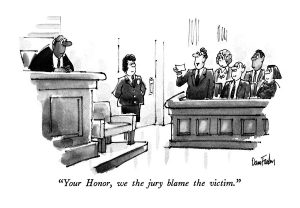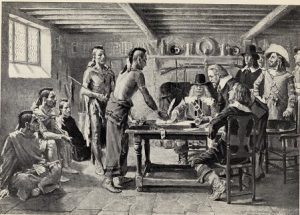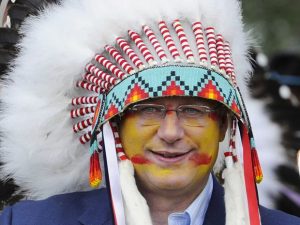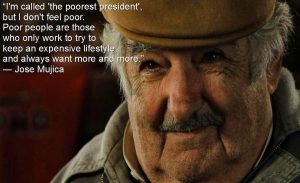I’d only been teaching a few years when I had a student who was so racist that I was forced to confront several of his statements in class. As anyone knows who has dealt with such behaviour, this demands a delicate hand. On more than one occasion, however, Rob helped me deal with his racism himself, albeit inadvertently.
I was teaching a text by an indigenous  author and Rob had taken offense to the notion that the Canadian government owed anything at all to the people whose land had been stolen. To express his dismay, he relied on an old standard of homegrown Canadian racism: blame the victim. He told me, and his fellow students, if anyone in class was still listening to him, that “The chiefs get all this money which is meant for their people and they keep it for themselves.”
author and Rob had taken offense to the notion that the Canadian government owed anything at all to the people whose land had been stolen. To express his dismay, he relied on an old standard of homegrown Canadian racism: blame the victim. He told me, and his fellow students, if anyone in class was still listening to him, that “The chiefs get all this money which is meant for their people and they keep it for themselves.”
This tired argument goes the rounds of Canada periodically, and typically it ends with a general call for even more scrutiny over the moneys owed to indigenous people, like the conservative think tank, the Fraser Institute. Although the treaties guaranteed a paltry amount of compensation for the theft of their land, and the indigenous people had signed them under duress, the British government,  and later the Canadian government, didn’t even honour those quasi-legal agreements. In fact, we enjoy the distinction that we have broken every treaty that we have signed. For instance, Canada reneged on its promise to cut greenhouse gases after we had signed the Paris Agreement. That might have surprised many Canadians, but likely not Indigenous people. Canada had never followed through on its promise of compensation to the indigenous people which we had taken the trouble to write into the treaties. In fact, even now, many years later, the government is still trying to claw back as much from the original promise as it can.
and later the Canadian government, didn’t even honour those quasi-legal agreements. In fact, we enjoy the distinction that we have broken every treaty that we have signed. For instance, Canada reneged on its promise to cut greenhouse gases after we had signed the Paris Agreement. That might have surprised many Canadians, but likely not Indigenous people. Canada had never followed through on its promise of compensation to the indigenous people which we had taken the trouble to write into the treaties. In fact, even now, many years later, the government is still trying to claw back as much from the original promise as it can.
When Rob made his statement he wasn’t interested in broken treaties, however. Such an argument about the  history of Canada, and how the treaties were broken, has little currency with the decidedly racist mindset armed with clichés and conservative talking points. I could have countered with the fact that the chief system was set up by the Indian act, just so the colonial government could deal with a man acting in the role they were accustomed to. The European governments were extremely hierarchal, and the colonizers had brought that unequal system with them. They couldn’t imagine a system of governance based on mutual respect or wisdom, with everyone in the community having a say in their future, so they tried to dismantle the Indigenous systems that they found. They thought of their system of autocratic leaders ruling by divine right—or some feudal version of that—as superior, so they forced that upon the Indigenous communities. The person who occupies this highly artificial role is therefore not beholden to his people, but rather Indian Affairs. In that sense, a corrupt chief could be said to be doing the bidding of his bosses.
history of Canada, and how the treaties were broken, has little currency with the decidedly racist mindset armed with clichés and conservative talking points. I could have countered with the fact that the chief system was set up by the Indian act, just so the colonial government could deal with a man acting in the role they were accustomed to. The European governments were extremely hierarchal, and the colonizers had brought that unequal system with them. They couldn’t imagine a system of governance based on mutual respect or wisdom, with everyone in the community having a say in their future, so they tried to dismantle the Indigenous systems that they found. They thought of their system of autocratic leaders ruling by divine right—or some feudal version of that—as superior, so they forced that upon the Indigenous communities. The person who occupies this highly artificial role is therefore not beholden to his people, but rather Indian Affairs. In that sense, a corrupt chief could be said to be doing the bidding of his bosses.
Many professors in my position would have simply ignored the situation by moving the discussion onto safer  ground, bidding the students to remember to respect all peoples, or in some soft-pedaled way ensuring that Rob felt emboldened to keep making such statements. They might have suggested that Rob meet them outside the class to discuss the matter, or directed his attention back to the text so that the author might shoulder the brunt of his attack. A braver professor could have simply called Rob wrong, and let the chips fall where they may, but I chose a different tactic.
ground, bidding the students to remember to respect all peoples, or in some soft-pedaled way ensuring that Rob felt emboldened to keep making such statements. They might have suggested that Rob meet them outside the class to discuss the matter, or directed his attention back to the text so that the author might shoulder the brunt of his attack. A braver professor could have simply called Rob wrong, and let the chips fall where they may, but I chose a different tactic.
Although I was new to teaching, I was intrigued by the  implications of Rob’s claim. I guessed he was mimicking similar sentiments he’d heard around him when he was growing up. He’d belonged to a country club in Vancouver which cost twenty thousand a year to join, he bragged to me on one occasion, and each sport he followed added another similar price tag. For all his wealth, however, he couldn’t attend university in Vancouver. He just wasn’t bright enough to make up for his inherent laziness. That intellectual lethargy was obvious in his racist claim, for instance, for we need look no further than much of our media to see and hear similar unexamined diatribes. Rob had never bothered to think about what he thought, or analyze what he was repeating, but that wasn’t what intrigued me most about his statement.
implications of Rob’s claim. I guessed he was mimicking similar sentiments he’d heard around him when he was growing up. He’d belonged to a country club in Vancouver which cost twenty thousand a year to join, he bragged to me on one occasion, and each sport he followed added another similar price tag. For all his wealth, however, he couldn’t attend university in Vancouver. He just wasn’t bright enough to make up for his inherent laziness. That intellectual lethargy was obvious in his racist claim, for instance, for we need look no further than much of our media to see and hear similar unexamined diatribes. Rob had never bothered to think about what he thought, or analyze what he was repeating, but that wasn’t what intrigued me most about his statement.
I was interested in what his words really meant.  Rob’s choice to read the chief’s role as something more like a caretaker, his wish to tie his statement to an ethnic group, meant he unwittingly ended up holding indigenous people to a higher standard than his own white community.
Rob’s choice to read the chief’s role as something more like a caretaker, his wish to tie his statement to an ethnic group, meant he unwittingly ended up holding indigenous people to a higher standard than his own white community.
Although the chief, even if Rob didn’t understand the position’s history as an arm of Indian Affairs, is a politician, Rob seemed to want to give the chief the role of a caretaker. His sentence suggested that he thought the position warranted a generous and altruistic person, and therefore he was dismayed when chiefs didn’t follow his rather high expectations.
I had two questions for Rob. I first suggested that he repeat his statement, and, as I called it, “Strip out the ethnicity.” What does that look like when we make it less racist?
“There are leaders appointed to a community who receive funding which is meant for everyone and they keep it for themselves.” Once Rob’s statement is decluttered, the racism disappears and it is merely a justified criticism of government in general, and particularly targets unscrupulous politicians. Unfortunately for Rob, many people already imagine that politicians are corrupt, and are often surprised when an honest one, such as José Alberto “Pepe” Mujica with the donation of his salary to housing projects and his modest way of living, is found.
that politicians are corrupt, and are often surprised when an honest one, such as José Alberto “Pepe” Mujica with the donation of his salary to housing projects and his modest way of living, is found.
Once we have removed Rob’s racism from his statement, it still retains its teeth, but it is directed toward bad behaviour more than a group of people. The implications of his new statement are also worth considering, however, for they bring another aspect of Rob’s racist ideals to light. He obviously agrees that when politicians fleece their people that is a bad thing, but he doesn’t seem to be surprised it happens. The problems with Indigenous politicians, or at least the concern he has in how he expressed it, exposes his way of thinking more clearly than he might have intended. Inadvertently, Rob was highlighting how indigenous politicians were similar to those of other ethnicity.
As I said to him in front of the class, “I think it’s great that you think indigenous people are better than whites. Although you should be careful. Some white people might find that offensive.”
“What?” Rob stammered when he was dumfounded.
“Well that’s what you said. You told me that you thought it was bad that the chiefs, or indigenous politicians, acted worse than whites. Which means that you hold their politicians to a higher standard. You must think that they are more ethical than us, and I think that’s very kind of you, although you should really think of all people as the same. Indigenous people aren’t any better than whites, even if their politicians cheated less.”
Rob was horrified by what his sentence had implied, and without formal training, I doubt he could have found it himself, but the idea was implicit in what he’d said. Although he was certain politicians were in general a corrupt bunch, he was most angry about indigenous politicians. That meant he thought they were automatically better, or else it would have made sense to have lumped them in with other politicians.
Rob was scarcely to blame for the implications of his racist sentiment, for they are always lurking behind the types of media sources which feed people like him their ideas. Every time the news makes a claim about corruption in the Indigenous community, the story is reported with the same Rob-type horror. Any other corruption scandals in the government are seen almost as a matter of course, such as the Brian Mulroney Airbus scandal, but rather flatteringly, the media, like Rob, hold the Indigenous politicians to a higher standard. Otherwise, they would act as though any politician would do the same, and spare the populace their strident outrage that an Indigenous politician would be corrupt.
Managing such statements in the classroom can be more than tiresome. They are also a potential minefield of racial-inspired invective, and should be dealt with carefully. Each case is different, but I have found the best strategy is to let the student’s words speak for them. They are often unaware of the implications of their statements, and as an instructor, it behooves us to assist them in realizing that although words have the power to hurt others, they can be much more dangerous to ourselves.
